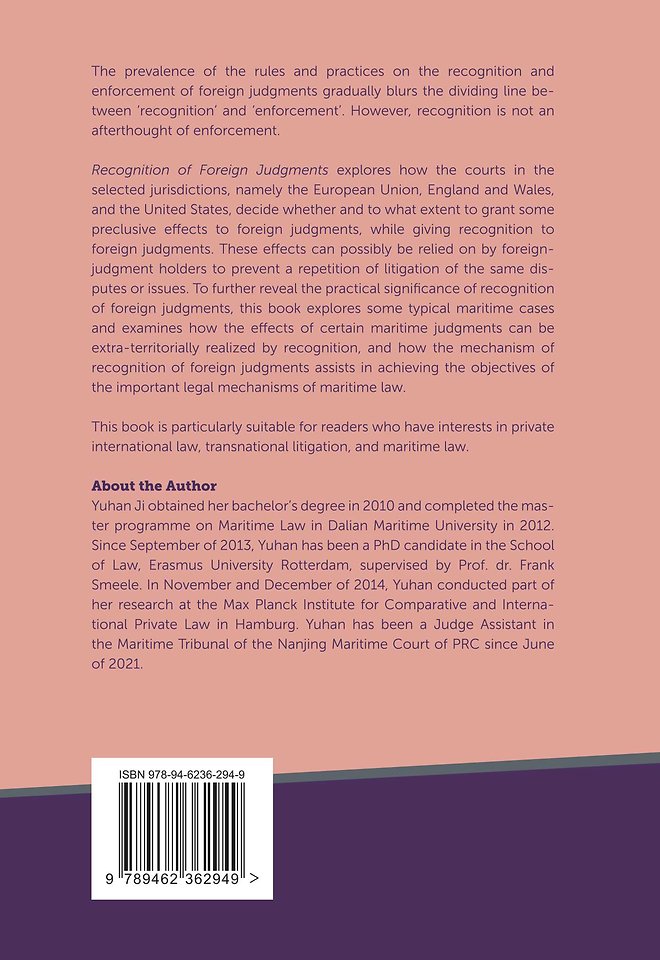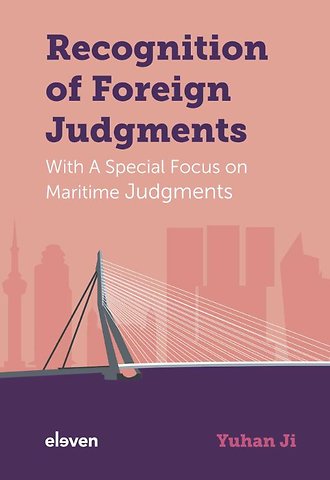Recognition of Foreign Judgments
With A Special Focus on Maritime Judgments
Samenvatting
The prevalence of the rules and practices on the recognition and enforcement of foreign judgments gradually blurs the dividing line between ‘recognition’ and ‘enforcement’.
However, recognition is not an afterthought of enforcement. Recognition of Foreign Judgments explores how the courts in the selected jurisdictions, namely the European Union, England and Wales, and the United States, decide whether and to what extent to grant some preclusive effects to foreign judgments, while giving recognition to foreign judgments. These effects can possibly be relied on by foreign judgment holders to prevent a repetition of litigation of the same disputes or issues. To further reveal the practical significance of recognition of foreign judgments, this book explores some typical maritime cases and examines how the effects of certain maritime judgments can be extra-territorially realized by recognition, and how the mechanism of recognition of foreign judgments assists in achieving the objectives of the important legal mechanisms of maritime law.
This book is particularly suitable for readers who have interests in private international law, transnational litigation, and maritime law.
Trefwoorden
Specificaties
Inhoudsopgave
1.1 Introduction 17
1.2 Research Questions 19
1.3 Research Design 20
1.3.1 The selected jurisdictions and legislations 20
1.3.2 Special focus on foreign maritime judgments 23
1.3.3 Outline 24
1.4 Methodology 24
1.4.1 Functional comparative approach 24
1.4.2 Legal analysis 25
1.5 Limitations 25
Part I Requirements and Refusal Grounds for the Recognition of Foreign Judgments
2 Requirements and Refusal Grounds 31
2.1 Introduction 31
2.2 Justifications 33
2.2.1 Brussels Ibis 33
2.2.2 English law 35
2.2.3 The US law 36
2.2.4 Summary and preliminary comparative remarks 38
2.3 Limits on judgments 38
2.4 Finality 39
2.4.1 Brussels Ibis 39
2.4.2 English law 40
2.4.3 The US law 40
2.4.4 Summary and preliminary comparative remarks 41
2.5 Jurisdiction of the foreign court 41
2.5.1 Brussels Ibis 42
2.5.2 English law 43
2.5.3 The US law 44
2.5.4 Summary and preliminary comparative remarks 47
2.6 Fair procedure 48
2.6.1 Brussels Ibis 48
2.6.1.1 Lack of service and notice sufficient to safeguard the defendant’s rights 49
2.6.1.2 Manifest breach of the right to a fair trial 49
2.6.2 English law 51
2.6.3 The US law 52
2.6.3.1 Unfairness of the foreign judicial system 52
2.6.3.2 Lack of service and other unfairness in foreign procedures 53
2.6.4 Summary and preliminary comparative remarks 54
2.7 Fraud 54
2.7.1 Brussels Ibis 54
2.7.2 English law 55
2.7.3 The US law 57
2.7.4 Summary and preliminary comparative remarks 58
2.8 Public policy exception 58
2.8.1 Brussels Ibis 59
2.8.2 English law 60
2.8.3 The US law 61
2.8.4 Summary and preliminary comparative remarks 62
2.9 Existence of another irreconcilable or conflicting judgment 63
2.9.1 Brussels Ibis 63
2.9.2 English law 64
2.9.3 The US law 65
2.9.4 Summary and preliminary comparative remarks 66
2.10 Concluding remarks 67
Part II Recognition of the Preclusive Effects of Foreign Judgments
3 Prevailing Approaches and Applicable Law 71
3.1 Introduction 71
3.2 Brussels Ibis 72
3.2.1 A technical interpretation of the concept of recognition 72
3.2.2 Problems of applicable law 74
3.3 English law 76
3.3.1 A unilateral approach 76
3.3.2 Preference for the lex fori 77
3.4 The US law 79
3.4.1 Two parallel approaches 79
3.4.2 Applicable law 80
3.4.2.1 Foreign law or local law? 80
3.4.2.2 Federal law or state law? 82
3.5 Concluding remarks 83
4 Recognition of Foreign Judgments and Claim Preclusion Effects 85
4.1 Introduction 85
4.2 Brussels Ibis 85
4.2.1 Precluding re-litigation for contradictory results 86
4.2.2 Precluding re-litigation for enforcement 88
4.3 English law 89
4.3.1 Precluding re-litigation for contradictory results 89
4.3.2 Precluding re-litigation for additional satisfaction 90
4.3.2.1 Common law 90
4.3.2.2 Statutes 91
4.3.3 Precluding re-litigation for enforcement 93
4.4 The US law 93
4.4.1 Precluding re-litigation for contradictory results 93
4.4.2 Precluding re-litigation for additional satisfaction 95
4.4.3 Precluding re-litigation for enforcement 96
4.4.4 Changes in American practice 96
4.5 Requirements for claim preclusion effects 97
4.5.1 Same cause of action 97
4.5.1.1 BrusselsIbis– the core issue theory forthe prevention of contradiction 97
4.5.1.2 English law – distinct scopes based on different purposes of re-litigation 100
4.5.1.3 The US law – moving to the broadest transactional test 102
4.5.2 Same parties 105
4.5.2.1 Brussels Ibis 105
4.5.2.2 English law 107
4.5.2.3 The US law 108
4.6 Concluding remarks 109
5 Recognition of Foreign Judgments and Issue Preclusion Effects 113
5.1 Introduction 113
5.2 Brussels Ibis 113
5.2.1 The prevailing approach? 113
5.2.2 Issues on jurisdiction 115
5.2.2.1 Foreign judgments merely on jurisdiction 115
5.2.2.2 The effect of the determination on jurisdiction contained in a foreign judgment 115
5.2.3 Other issues? 117
5.3 English law 117
5.3.1 Unilateral approach confirmed 117
5.3.2 Issues of fraud 118
5.3.3 Issues of jurisdiction 119
5.3.2.1 Foreign judgment merely on jurisdiction 119
5.3.2.2 The effect of the determination on jurisdiction contained in a foreign judgment 120
5.4 The US law 123
5.4.1 Approach decided by the practical needs 123
5.4.2 Issues of jurisdiction 125
5.4.2.1 Foreign judgments merely on jurisdiction 125
5.4.2.2 The effect of the determination on jurisdiction contained in a foreign judgment 125
5.5 Requirements for issue preclusion effects 126
5.5.1 Same issues 126
5.5.1.1 Brussels Ibis 126
5.5.1.2 English law 127
5.5.1.3 The US law 130
5.5.2 Same parties 134
5.5.2.1 Brussels Ibis 134
5.5.2.2 English law 135
5.5.2.3 The US law 137
5.5.3 Other considerations 142
5.5.3.1 English law 142
5.5.3.2 The US law 143
5.6 Concluding remarks 144
Part III Recognition of Foreign Judgments With a Focus on Maritime Cases
6 Recognition of Foreign Judgments in Typical Maritime Cases 149
6.1 Introduction 149
6.2 Recognition of foreign ship arrest orders 150
6.2.1 Introduction 150
6.2.2 The nature of ship arrest orders 151
6.2.3 Recognition of foreign ship arrest orders 151
6.2.3.1 Recognition of foreign provisional measures in general 151
6.2.3.2 Qualifying ship arrest orders as provisional measures under Brussels Ibis 153
6.2.4 Recognition of the effect of foreign arrest orders 155
6.2.4.1 The effect ofship arrest orders on precluding re-arrest of ships 155
6.2.4.2 Recognition of foreign ship arrest order under Brussels Ibis 156
6.2.5 Recognition and enforcement of foreign arrest orders 157
6.2.6 Concluding remarks 159
6.3 Recognition of foreign judgments in limitation of liability cases 160
6.3.1 Introduction 160
6.3.2 Different Approaches to limit liability 164
6.3.2.1 Invoking the right to limit as a defense 164
6.3.2.1 Constituting a limitation fund and its consequences under LLMCs 165
6.3.3 Limits to the erga omnes effect of limitation fund 167
6.3.4 Recognition of a foreign limitation fund 168
6.3.4.1 Recognition of foreign judgments on the constitution of limitation fund 168
6.3.4.2 Erga omnes effect of limitation fund strengthened by the Brussels Regime 171
6.3.5 Recognition of liability judgments/settlements in limitation proceedings 173
6.3.5.1 Recognition of a prior settlement/payment 173
6.3.5.2 Recognition of a prior unpaid liability judgment 174
6.3.6 Concluding remarks 177
6.4 Recognition of foreign judicial sales of ships 178
6.4.1 Introduction 178
6.4.2 Recognition of foreign judicial sales of ships 179
6.4.2.1 From old principle to uniform rules 179
6.4.2.2 The effect of judicial sales of ships under national laws 182
6.4.2.3 The international effect of foreign judicial sales of ships 183
6.4.2.4 The effect of recognition of foreign judicial sales of ships 188
6.4.3 Refusal grounds for the recognition of foreign judicial sales of ships 191
6.4.3.1 A final judgment? 192
6.4.3.2 Jurisdiction of the foreign court that conducted the judicial sale 192
6.4.3.4 Fraud 193
6.4.3.5 Public policy 194
6.4.4 Concluding remarks 195
6.5 Conclusion 196
7 Procedures for the Recognition of Foreign Judgments – with a Focus on Maritime Judgments 199
7.1 Introduction 199
7.2 Brussels Ibis 200
7.2.1 General procedures for the recognition of foreign judgments 200
7.2.2 Jurisdiction requirements for the application of enforcement 201
7.2.3 Coordination with international maritime conventions 202
7.2.3.1 Article 71 Brussels Ibis and the pre-Brussels I maritime conventions 202
7.2.3.2 Council decisions and the post-Brussels I maritime conventions 205
7.2.4 Preliminary summary 208
7.3 English law 208
7.3.1 General procedures for the recognition of foreign judgments 208
7.3.2 Admiralty procedure for the recognition of foreign maritime judgments 210
7.3.2.1 Recognition and enforcement of foreign maritime judgments in the admiralty jurisdiction 210
7.3.2.2 Recognition and enforcement of foreign maritime judgments by action in rem 211
7.3.2.3 Recognition and Enforcement of foreign judgments under international maritime conventions 214
7.3.3 Preliminary summary 216
7.4 The US law 216
7.4.1 General procedures for the recognition of foreign judgments 216
7.4.1.1 The approaches under the statute and common law 216
7.4.1.2 Jurisdiction requirementsforrecognition actionswith enforcement purposes 218
7.4.2 Admiralty procedure for the recognition of foreign maritime judgments 220
7.4.2.1 Federal admiralty jurisdiction for recognition and enforcement of foreign judgments 221
7.4.2.2 Enforcement action by Rule B 224
7.4.3 Preliminary summary 229
7.5 Concluding remarks 230
8 Observations and Concluding Remarks 233
8.1 Traditional aspect of recognition of foreign judgments 233
8.2 Recognition of the preclusive effect of foreign judgments 234
8.3 Recognition of foreign judgments with constitutive effect and its significance 236
8.3.1 The role of the law applied by the foreign court 237
8.3.2 Significance of recognition of foreign judgments with constitutive effect 238
8.4 Tendency towards recognition of foreign provisional measures 238
8.5 Procedures for the recognition of foreign judgments 239
8.6 Final Conclusion 241
Bibliography 243
Table of cases 259
Index 271
Acknowledgements 273
Anderen die dit boek kochten, kochten ook
Rubrieken
- cadeauboeken
- computer en informatica
- economie
- filosofie
- flora en fauna
- geneeskunde
- geschiedenis
- gezondheid
- jeugd
- juridisch
- koken en eten
- kunst en cultuur
- literatuur en romans
- mens en maatschappij
- naslagwerken
- non-fictie informatief/professioneel
- paramedisch
- psychologie
- reizen
- religie
- schoolboeken
- spiritualiteit
- sport, hobby, lifestyle
- thrillers en spanning
- wetenschap en techniek
- woordenboeken en taal









